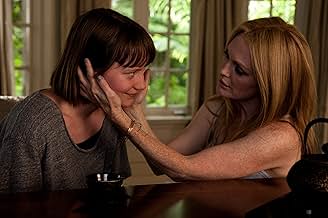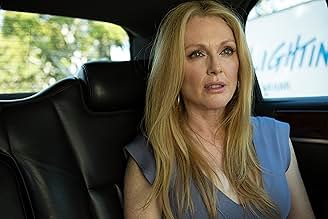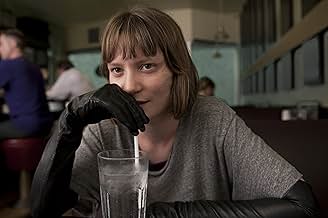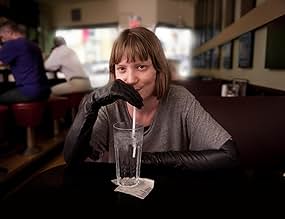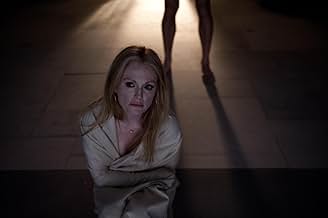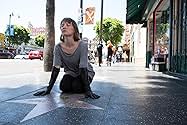AVALIAÇÃO DA IMDb
6,2/10
44 mil
SUA AVALIAÇÃO
Uma viagem através do coração de uma família de Hollywood que persegue celebridades, uns aos outros e os fantasmas implacáveis de seu passado.Uma viagem através do coração de uma família de Hollywood que persegue celebridades, uns aos outros e os fantasmas implacáveis de seu passado.Uma viagem através do coração de uma família de Hollywood que persegue celebridades, uns aos outros e os fantasmas implacáveis de seu passado.
- Prêmios
- 10 vitórias e 24 indicações no total
Avaliações em destaque
A film worth revisiting, if my experience is anything to go by. I didn't think it was up to much the first time, but the BBC put it on again and this time I watched it twice and probably will at least once more, partly for Julianne Moore, who's pretty astonishing, playing an almost unprecedentedly monstrous grotesque, and partly for the frequent patches of brilliantly written dialogue (take a bow, Bruce Wagner). Moore's dialogue is almost always good, but that of 13-year-old move star and recovering drug abuser Benji also packs a vicious punch, and elsewhere, more subtly, in the mouths of Mia Wasikovska and Robert Pattinson's characters, Wagner does probably the best depiction I've ever seen of how young adults actually talk a lot of the time: confused, insecure and just barely covering it up.
All this is something like what we might see - and most importantly hear - if anyone ever filmed a Brett Eason Ellis novel properly, without being afraid of going to town on the dialogue (why hasn't Cronenburg ever worked with Ellis?). As such, it's an interesting point of comparison with Cronenburg's previous film, Cosmopolis, also heavy on the chilly, anomic modern rich person dialogue, courtesy of Don de Lillo, which, taken on its own, looks like woefully pretentious proof that you can't do this in film. Turns out you can, with bells on, though actually, Cronenburg films have been demonstrating this at least since Dead Ringers.
Other than these talky highlights, I think this film has a few problems of its own, some of them maybe also around pretentiousness. The big one for me is just the messiness of the message and plot, as a unity, which it isn't really. Moore's storyline on its own is a perfect, pitilessly poisonous Hollywood satire. Does it really need, in addition, a parallel plot that never quite meshes about incest and schizophrenia? Why? To round it out to feature film length? To give it some spurious intellectual heft in the form of references to Greek tragedy and elemental symbolism?
To be honest, there may be a puzzle here that I haven't worked out, because quite a lot of that dialogue I like so much seems to be satirising precisely such tendencies, particularly when Moore's character ghoulishly invokes fire and water to implicitly celebrate the death of a child because it gets her a part. And that's another reason I might watch again. But still, the problem remains, I don't think you need the incest or the schizophrenia to satirise Hollywood, because it introduces a sort of separate issue, a distinct emotional antagonist if you will, where Hollywood itself seems like the real target and should surely be all you need to explain all this very bad behaviour.
All this is something like what we might see - and most importantly hear - if anyone ever filmed a Brett Eason Ellis novel properly, without being afraid of going to town on the dialogue (why hasn't Cronenburg ever worked with Ellis?). As such, it's an interesting point of comparison with Cronenburg's previous film, Cosmopolis, also heavy on the chilly, anomic modern rich person dialogue, courtesy of Don de Lillo, which, taken on its own, looks like woefully pretentious proof that you can't do this in film. Turns out you can, with bells on, though actually, Cronenburg films have been demonstrating this at least since Dead Ringers.
Other than these talky highlights, I think this film has a few problems of its own, some of them maybe also around pretentiousness. The big one for me is just the messiness of the message and plot, as a unity, which it isn't really. Moore's storyline on its own is a perfect, pitilessly poisonous Hollywood satire. Does it really need, in addition, a parallel plot that never quite meshes about incest and schizophrenia? Why? To round it out to feature film length? To give it some spurious intellectual heft in the form of references to Greek tragedy and elemental symbolism?
To be honest, there may be a puzzle here that I haven't worked out, because quite a lot of that dialogue I like so much seems to be satirising precisely such tendencies, particularly when Moore's character ghoulishly invokes fire and water to implicitly celebrate the death of a child because it gets her a part. And that's another reason I might watch again. But still, the problem remains, I don't think you need the incest or the schizophrenia to satirise Hollywood, because it introduces a sort of separate issue, a distinct emotional antagonist if you will, where Hollywood itself seems like the real target and should surely be all you need to explain all this very bad behaviour.
You would think that the soap operatic sentiments (incest, famous mothers, mysterious personal assistants, haughty child stars, and more) of Maps to the Stars would give it an enjoyably melodramatic edge, but instead of being an absurdly funny Hollywood satire, it mopes along with writhing cynicism until characters begin to set themselves on fire and get bludgeoned to death. The characters are nasty, the story lines are nasty, and so are the expensive furnishings; you probably haven't seen a Tinsel Town film this contemptuous, but you certainly have had better times at the movies before. The cynicism of Maps to the Stars is notable, but it becomes so increasingly dark that it goes from bracingly edgy to staunchly depressing. You wouldn't expect anything different from the macabre adoring David Cronenberg, but there might be a part of you that wishes we were lurking in the shadow of the soul sister of The Player instead of Debbie Downer's.
David Lynch got his kicks destroying the lives of the characters Naomi Watts and Laura Elena Harring played in Mulholland Dr., and Cronenberg has no trouble poisoning the wells the people in Maps to the Stars drink from. The Weiss family, who mirror the shameful dysfunction of the Spears' or the Lohan's, have slithered their way into Hollywood, but the scraggly hole they snuck in through is rapidly closing. Stafford Weiss (John Cusack) makes a living as a famed television psychiatrist with a starry clientèle, while his 13-year son (Evan Bird) is a successful child actor who headlines a shitty franchise when he's not residing in rehab. Christina, mother to Benjie and wife to Stafford, acts as her son's agent, clinging to his fame as she tries to find meaning in her empty, sad life.
Havana Segrand (Julianne Moore), one of Stafford's many patients, is an aging, irrelevant actress whose entire career has been overshadowed by her legendary mother (Sarah Gadon), who prematurely died in a house fire in the 1970s. Making her way into town is the enigmatic Agatha (Mia Wasikowska), a young woman with troubling burns on the side of her body; she finds a job as Havana's personal assistant, but her dangerous connection with the Weiss family leaves her slightly cursed.
If I've explained the plot well (and I probably haven't), then Maps to the Stars might sound enticing, carrying the same self-awareness of Twin Peaks while retaining the screeching satire of Sunset Boulevard. Wrong and wrong. I desperately wanted to like Maps to the Stars, (Julianne Moore and Mia Wasikowska are certainly two of Hollywood's most talented actresses and Cronenberg is a consistently interesting director), but it's much too unlikable to be anything other than dreary. The humor is sharp, but when humor is also underlined in a pen based in gloominess, it's hard to do anything other than remained sickened. The blame can't be placed on Cronenberg — his claustrophobic, fearlessly ghoulish filmmaking style is as fresh as ever — but on Wagner, whose screenplay wants to be sardonic but eventually runs out of ideas. The ending, which is essentially a series of disturbing character offings, seems like an act of haste instead of a necessity.
But if Maps to the Stars isn't as delicious as I wish it was, it never stops being watchable, in part to the cast (a round-table of fantastic performances) and in part to Cronenberg's unwaveringly creepy handling of it all. It isn't necessarily a horror film, but there's always a part of us that twitches in fear that something bad will happen. Bad stuff unavoidably does happen; I just wish the negativity was more creative. But if the woods are lovely, dark, and deep and you've got promises to maintain your derisive mood, Maps to the Stars might contain just enough pessimism to toot your raincloud drenched horn.
Read more reviews at petersonreviews.com
David Lynch got his kicks destroying the lives of the characters Naomi Watts and Laura Elena Harring played in Mulholland Dr., and Cronenberg has no trouble poisoning the wells the people in Maps to the Stars drink from. The Weiss family, who mirror the shameful dysfunction of the Spears' or the Lohan's, have slithered their way into Hollywood, but the scraggly hole they snuck in through is rapidly closing. Stafford Weiss (John Cusack) makes a living as a famed television psychiatrist with a starry clientèle, while his 13-year son (Evan Bird) is a successful child actor who headlines a shitty franchise when he's not residing in rehab. Christina, mother to Benjie and wife to Stafford, acts as her son's agent, clinging to his fame as she tries to find meaning in her empty, sad life.
Havana Segrand (Julianne Moore), one of Stafford's many patients, is an aging, irrelevant actress whose entire career has been overshadowed by her legendary mother (Sarah Gadon), who prematurely died in a house fire in the 1970s. Making her way into town is the enigmatic Agatha (Mia Wasikowska), a young woman with troubling burns on the side of her body; she finds a job as Havana's personal assistant, but her dangerous connection with the Weiss family leaves her slightly cursed.
If I've explained the plot well (and I probably haven't), then Maps to the Stars might sound enticing, carrying the same self-awareness of Twin Peaks while retaining the screeching satire of Sunset Boulevard. Wrong and wrong. I desperately wanted to like Maps to the Stars, (Julianne Moore and Mia Wasikowska are certainly two of Hollywood's most talented actresses and Cronenberg is a consistently interesting director), but it's much too unlikable to be anything other than dreary. The humor is sharp, but when humor is also underlined in a pen based in gloominess, it's hard to do anything other than remained sickened. The blame can't be placed on Cronenberg — his claustrophobic, fearlessly ghoulish filmmaking style is as fresh as ever — but on Wagner, whose screenplay wants to be sardonic but eventually runs out of ideas. The ending, which is essentially a series of disturbing character offings, seems like an act of haste instead of a necessity.
But if Maps to the Stars isn't as delicious as I wish it was, it never stops being watchable, in part to the cast (a round-table of fantastic performances) and in part to Cronenberg's unwaveringly creepy handling of it all. It isn't necessarily a horror film, but there's always a part of us that twitches in fear that something bad will happen. Bad stuff unavoidably does happen; I just wish the negativity was more creative. But if the woods are lovely, dark, and deep and you've got promises to maintain your derisive mood, Maps to the Stars might contain just enough pessimism to toot your raincloud drenched horn.
Read more reviews at petersonreviews.com
Most of David Cronenberg's films range from good to outstanding. Some of his work disappointed me or evoked a relatively mixed reaction from me, but on the most part he is a very interesting director who does stand out in a good way. The cast are very talented, Julianne Moore especially, while one can understand why Cronenberg frequently used Howard Shore as his composer of choice and their collaborations is one of the best and most consistent director-composer collaborations in my view (am especially fond of his work for 'The Fly').
It is said with sadness that despite hearing good things about it (though it's understandably very polarising here), 'Maps to the Stars' disappointed me. It is far from a terrible film, don't even think it's a bad film, but it for me was a long way from great. Much to admire but do have to share some of the criticisms here, a great concept with inconsistent execution of it. As far as Cronenberg's work goes, 'Maps to the Stars' is better than 'Stereo', 'Crimes of the Future' and 'Cosmopolis' but it is a lesser film of his, nowhere near the level of 'The Fly', 'Dead Ringers', 'Eastern Promises', 'A History of Violence' and 'Spider'.
There are good things with 'Maps to the Stars'. It looks wonderful, excepting the somewhat fake-looking fire, then again it is Cronenberg whose work from the late 1970s onwards always ranked high on a visual level (of his overall output 'Rabid' and 'Shivers' were the only real exceptions in this regard). The cinematography is stylish and quite stunning to look at, sunshine has rarely blazed in such a wonderfully dazzling way in film. Shore's score is subtly unsettling and Cronenberg does deliver in the visual aspect of his directing.
Some of the satire is fiercely sharp and darkly funny and it is the satire where 'Maps to the Stars' fares best. Really admired the cast here, with Moore being excellent in the lead in her best performance in years (perhaps since 'Boogie Nights'). Evan Bird shows himself to be a young actor with huge potential, a very beyond his years performance. Have not seen a better performance from Mia Wasikowska in her most daring role and she is very affecting in it, seeing John Cusack and Olivia Williams in different roles and excelling was great to see. Robert Pattinson is much better than he was in 'Cosmopolis' and as others have said he has come on a long way since 'Twilight'.
For all those great things, 'Maps to the Stars' just didn't connect with me. Despite a promising start, there is a major change of tone that jars badly and then the film becomes unfocused and rather strange. The satirical edge is done well, but the vulgarity does get very over-the-top and mean-spirited and the cynical edge is overdone at times too. The more surreal elements didn't come over as either dreamlike or nightmarish, not much eerie here, too much of the scenes veered on ridiculous and felt very hokey. Emotionally, 'Maps to the Stars' should have been poignant but it felt too cold and clinical (Cronenberg's direction on the most part is the same). The pace can drag and with the trimming or excision of scenes that felt like padding that added nothing it would have felt much better. Cronenberg can do weird and disturbing very well, evident when he pioneered body horror, but very rarely to to such kitchen-sink or muddled effect.
Didn't feel for any of the characters apart from disgust, am aware they were not meant to be likeable and be unpleasant but the film failed too to make them properly fleshed out. The only character who came close to evoking any sympathy from me was Agatha, then her true colours were revealed and that was lost. Found that the film tried to do too many things and have too many strands and elements, and too many of them were given short shrift (the Cusack and Olivia Williams subplot was severely under-explored) or became convoluted, with too many things leaving the viewer perplexed due to being unexplained or poorly resolved. The script is not as rambling or bloated as that for 'Cosmopolis' but it is the most gratuitously crass script of any Cronenberg film and never sounds natural. The ending felt tacked on.
Altogether, not my cup of tea sadly but did find still a good number of great things about it. 5/10
It is said with sadness that despite hearing good things about it (though it's understandably very polarising here), 'Maps to the Stars' disappointed me. It is far from a terrible film, don't even think it's a bad film, but it for me was a long way from great. Much to admire but do have to share some of the criticisms here, a great concept with inconsistent execution of it. As far as Cronenberg's work goes, 'Maps to the Stars' is better than 'Stereo', 'Crimes of the Future' and 'Cosmopolis' but it is a lesser film of his, nowhere near the level of 'The Fly', 'Dead Ringers', 'Eastern Promises', 'A History of Violence' and 'Spider'.
There are good things with 'Maps to the Stars'. It looks wonderful, excepting the somewhat fake-looking fire, then again it is Cronenberg whose work from the late 1970s onwards always ranked high on a visual level (of his overall output 'Rabid' and 'Shivers' were the only real exceptions in this regard). The cinematography is stylish and quite stunning to look at, sunshine has rarely blazed in such a wonderfully dazzling way in film. Shore's score is subtly unsettling and Cronenberg does deliver in the visual aspect of his directing.
Some of the satire is fiercely sharp and darkly funny and it is the satire where 'Maps to the Stars' fares best. Really admired the cast here, with Moore being excellent in the lead in her best performance in years (perhaps since 'Boogie Nights'). Evan Bird shows himself to be a young actor with huge potential, a very beyond his years performance. Have not seen a better performance from Mia Wasikowska in her most daring role and she is very affecting in it, seeing John Cusack and Olivia Williams in different roles and excelling was great to see. Robert Pattinson is much better than he was in 'Cosmopolis' and as others have said he has come on a long way since 'Twilight'.
For all those great things, 'Maps to the Stars' just didn't connect with me. Despite a promising start, there is a major change of tone that jars badly and then the film becomes unfocused and rather strange. The satirical edge is done well, but the vulgarity does get very over-the-top and mean-spirited and the cynical edge is overdone at times too. The more surreal elements didn't come over as either dreamlike or nightmarish, not much eerie here, too much of the scenes veered on ridiculous and felt very hokey. Emotionally, 'Maps to the Stars' should have been poignant but it felt too cold and clinical (Cronenberg's direction on the most part is the same). The pace can drag and with the trimming or excision of scenes that felt like padding that added nothing it would have felt much better. Cronenberg can do weird and disturbing very well, evident when he pioneered body horror, but very rarely to to such kitchen-sink or muddled effect.
Didn't feel for any of the characters apart from disgust, am aware they were not meant to be likeable and be unpleasant but the film failed too to make them properly fleshed out. The only character who came close to evoking any sympathy from me was Agatha, then her true colours were revealed and that was lost. Found that the film tried to do too many things and have too many strands and elements, and too many of them were given short shrift (the Cusack and Olivia Williams subplot was severely under-explored) or became convoluted, with too many things leaving the viewer perplexed due to being unexplained or poorly resolved. The script is not as rambling or bloated as that for 'Cosmopolis' but it is the most gratuitously crass script of any Cronenberg film and never sounds natural. The ending felt tacked on.
Altogether, not my cup of tea sadly but did find still a good number of great things about it. 5/10
We used to expect gross-out horror from David Cronenberg. Now he gives us weird and weirder. MAPS TO THE STARS is set in a Tinseltown of designer homes, designer shops and exclusive restaurants. The background 'sheen' is reminiscent of an Almodovar movie, plus there's a Gothic element borrowed from Shyamalan (Agatha and Benjie see dead people). Julianne Moore's performance is in the kind of hyper-drive she brought to BOOGIE NIGHTS, which helps to power the movie's gearshift from Hollywood satire into violent melodrama. One of the themes is incest, which surely needed a deeper and subtler exploration.
Robert Pattinson takes another step away from the Twilight Zone in the role of a limo driver with screen writing aspirations (like every other chauffeur in Los Angeles). Cronenberg is clearly reaching out towards a more discerning class of viewer. MAPS TO THE STARS is very much an 'auteur' movie, highly intelligent and stylized, but perhaps perched uncomfortably between satire and psychodrama.
Robert Pattinson takes another step away from the Twilight Zone in the role of a limo driver with screen writing aspirations (like every other chauffeur in Los Angeles). Cronenberg is clearly reaching out towards a more discerning class of viewer. MAPS TO THE STARS is very much an 'auteur' movie, highly intelligent and stylized, but perhaps perched uncomfortably between satire and psychodrama.
Probably the weirdest monster you'll come across this year, David Cronenberg's Map to the Stars is an odd animal full of wit, charm, and pure entertainment value. Definitely not for the faint of heart, but for those who love rich and layered characters, Cronenberg takes on Hollywood with zeal and humor. Some may classify the attempt as "mean," but no different from what Martin Scorsese brought to the table with The Wolf of Wall Street, a black comedy with a much deeper message is fully on display.
Bruce Wagner's script is a masterclass of writing. He finds all unique characters within our social existences and assembles them with stunning resolve. It's hard to believe the guy who wrote "A Nightmare on Elm Street 3: The Dream Warriors" could be capable of such a feat. We also get a subtle score by Howard Shore and stunning contemporary costumes by Denise Cronenberg. Not since The Devil Wears Prada has fashion felt like a separate character piece on a contemporary film set.
With no short of brilliance, the entire cast ignites some of their finest and most compelling works of their careers. It starts obviously with another powerhouse turn by four-time Academy Award nominee Julianne Moore. As "Havana Segrand," an actress dying for a big comeback, Moore illustrates her most vibrant and fruitful interpretation since "Cathy Whitaker" in Far from Heaven. Ferocious, daring, and completely involved, there's no other actress like Julianne Moore on this cinematic planet. Too good for words.
Everything seemed to finally click for actress Mia Wasikowska in her most daring performance to date. A ticking time bomb of emotion, her interpretation of "Agatha" is damn near close to terrifying. Robert Pattinson leaves all his "Twilight" days behind him and continues to evolve as a true performer. Cronenberg obviously knows what the heartthrob is capable of as he continues to use him frequently.
John Cusack and Olivia Williams are a match made in cinema hell, which secretly means heaven. Two people who are despicable together, the pair play insanely well off each other, showcasing luscious movements that all ring true. The young Evan Bird will have all of us learning his name by end credits. Lots of child stars make soft transitions in upbeat films like Little Miss Sunshine and Whale Rider. This is a brave and charismatic performance, channeling the aura of Justin Bieber (unfortunately just based on looks) but with tenacity as such performers as Ryan Gosling.
There are some tough pills to swallow during the viewing. There's incest, murder, "mean girl," moments, children dying which has characters happy to see it, it just doesn't seem to end. However, you will be entranced and placed under its spell from moment one. Cronenberg takes on subjects like violence and family with assurance. He's displayed this ability many times over in his filmmography. Map to the Stars stands tall with all the director's previous efforts.
Map to the Stars is not coy and completely confident in its demeanor. A well orchestrated and symbolic film that stands as one of the year's best films. This is Cronenberg's best effort since A History of Violence.
Bruce Wagner's script is a masterclass of writing. He finds all unique characters within our social existences and assembles them with stunning resolve. It's hard to believe the guy who wrote "A Nightmare on Elm Street 3: The Dream Warriors" could be capable of such a feat. We also get a subtle score by Howard Shore and stunning contemporary costumes by Denise Cronenberg. Not since The Devil Wears Prada has fashion felt like a separate character piece on a contemporary film set.
With no short of brilliance, the entire cast ignites some of their finest and most compelling works of their careers. It starts obviously with another powerhouse turn by four-time Academy Award nominee Julianne Moore. As "Havana Segrand," an actress dying for a big comeback, Moore illustrates her most vibrant and fruitful interpretation since "Cathy Whitaker" in Far from Heaven. Ferocious, daring, and completely involved, there's no other actress like Julianne Moore on this cinematic planet. Too good for words.
Everything seemed to finally click for actress Mia Wasikowska in her most daring performance to date. A ticking time bomb of emotion, her interpretation of "Agatha" is damn near close to terrifying. Robert Pattinson leaves all his "Twilight" days behind him and continues to evolve as a true performer. Cronenberg obviously knows what the heartthrob is capable of as he continues to use him frequently.
John Cusack and Olivia Williams are a match made in cinema hell, which secretly means heaven. Two people who are despicable together, the pair play insanely well off each other, showcasing luscious movements that all ring true. The young Evan Bird will have all of us learning his name by end credits. Lots of child stars make soft transitions in upbeat films like Little Miss Sunshine and Whale Rider. This is a brave and charismatic performance, channeling the aura of Justin Bieber (unfortunately just based on looks) but with tenacity as such performers as Ryan Gosling.
There are some tough pills to swallow during the viewing. There's incest, murder, "mean girl," moments, children dying which has characters happy to see it, it just doesn't seem to end. However, you will be entranced and placed under its spell from moment one. Cronenberg takes on subjects like violence and family with assurance. He's displayed this ability many times over in his filmmography. Map to the Stars stands tall with all the director's previous efforts.
Map to the Stars is not coy and completely confident in its demeanor. A well orchestrated and symbolic film that stands as one of the year's best films. This is Cronenberg's best effort since A History of Violence.
Você sabia?
- CuriosidadesAccording to screenwriter Bruce Wagner, the casting of Robert Pattinson was what finally got the movie made, financially speaking.
- Erros de gravaçãoWhen Jerome is driving Havana, they are in a long wheelbase 'L' version of Lincoln Town Car, when they've arrived at her house and are having sex in the back, they are in a standard wheelbase version (it has a shorter quarter glass section in the rear door window).
- Citações
Agatha Weiss: [Agatha recites poetry from Paul Éluard's poem, Liberty, translated from French] On my school notebook, on my desk and the trees, on the sand and the snow, I write your name. On all the flesh that says yes, on the forehead of my friends, on every hand held out, I write your name. Liberty.
- ConexõesFeatured in Renegade Cut: Maps to the Stars (2015)
- Trilhas sonorasNa Na Hey Hey Kiss Him Goodbye
Written by Gary DeCarlo,Paul Leka and Dale Frashuer
Performed by Julianne Moore and Mia Wasikowska
Principais escolhas
Faça login para avaliar e ver a lista de recomendações personalizadas
- How long is Maps to the Stars?Fornecido pela Alexa
Detalhes
- Data de lançamento
- Países de origem
- Central de atendimento oficial
- Idioma
- Também conhecido como
- Mapa a las estrellas
- Locações de filme
- Empresas de produção
- Consulte mais créditos da empresa na IMDbPro
Bilheteria
- Orçamento
- US$ 15.000.000 (estimativa)
- Faturamento bruto nos EUA e Canadá
- US$ 350.741
- Fim de semana de estreia nos EUA e Canadá
- US$ 143.422
- 1 de mar. de 2015
- Faturamento bruto mundial
- US$ 4.510.934
- Tempo de duração1 hora 51 minutos
- Cor
- Mixagem de som
- Proporção
- 1.85 : 1
Contribua para esta página
Sugerir uma alteração ou adicionar conteúdo ausente








